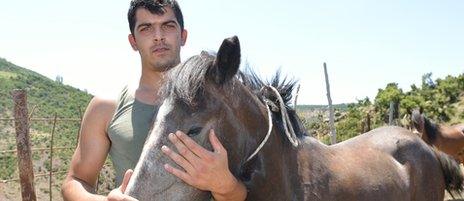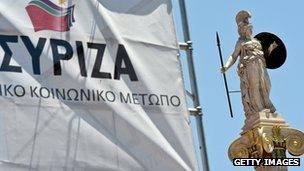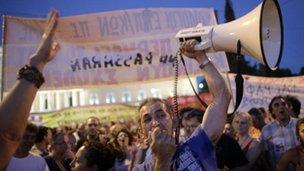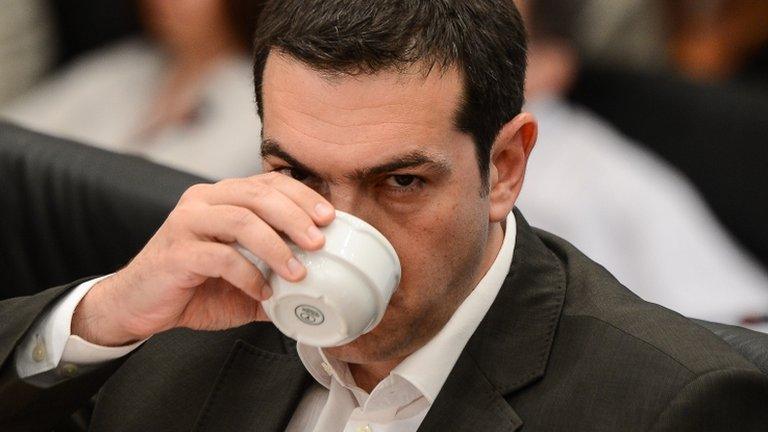Why young rural Greeks are set to embrace Syriza
- Published
- comments

"People are desperate that something can change," says Iannis Tsantouris
We drive north from Athens into Thessaly, where once you leave the sea road, the mountains hide a vast alluvial inland plain.
This is green Greece. Fertile with wheat, nuts, olives and cattle. The cow bells and the steep mountain roads make if feel like Switzerland, albeit a Switzerland with 40 degree heat and crazy drivers.
I have come to the village of Anavra because it has got a reputation for economic success. They are doing eco-farming. They have got young people moving there because of the economic crisis in other regions - in fact they are having to fend off incomers.
We sit in the taverna in the main square, the young farmers in their bib-and-brace overalls, already by 12 noon the plastic tables are littered with beer bottles and cigarette ash. These are the good-old-boys of Greece in the making, their battered, hay-plastered SUVs at the roadside.
Greek Shopkeeper Spyros Makrigiannis: "No lamb next Easter, just bread, oil and oregano"
Their complaint is that governments have done nothing for farmers. That foreign imports are destroying their livelihoods. These are the normal complaints about farming. Then I ask them about politics and they come out with the normal complaints as well:
"The politicians are corrupt," says 30-year-old Stathis Mithroleos. "We're the generation that should be peaking now. I have two children and I am worried about them. If I knew things would be like this I would not have got married."
Then something happens that is not normal. In the baking heat, and amid the beer fumes, one by one they tell me who they'll vote for: "Syriza, Syriza, Syriza, Syriza…"
Do they realise Syriza is a Marxist party and that its leader, Alexis Tsipras, has no experience of government?
"People are desperate that something can change. Tsipras is new. Let's see what he's going to offer," says 22-year-old Iannis Tsantouris.
Apostolos Mithroleos, aged 25, says: "Of course we're worried that Syriza will take us out of the euro. We don't want to vote for them but we have to because we've seen no good from the others in all these years."
For a party that, until 2008 never got above 4% of the vote, and whose influence was confined to people who know the difference between Foucault, external and Althusser, external, this is some turnaround.

Syriza is an alliance of radical parties and movements
Syriza is an alliance of radical parties and movements but at its core are activists who, via one path or another, discovered a formula that has evaded most of the European left.
With its origins in eurocommunism - the current in the 1970s which defied Moscow and engaged with parliamentary politics at a national level in Europe, Syriza contains also Trotskyists, anarchists, feminists and eco-warriors.
When I say "contains", it hardly actually contains them: its membership is still low. When I met Syriza activists in Patras earlier this year it was in the cultural centre (a trendy youth bar) of one of its component parties, which was a Maoist group: but almost all the activists claimed not to be actual members of Syriza itself, on the grounds of one or other piece of political doctrine they did not like.
Some of its star names - television demands parties have star names - are people I've seen with smeared faces trying to link arms and impose discipline in the middle of riots on Syntagma square last summer - ie, frankly, to dissuade their followers from joining in the rock throwing, but to face down the riot police.
In Anavra, the farming town, I would hazard a guess there is not a single activist from Syriza, nor did I spot a single poster for the party. Likewise I would suggest agriculture is not one of the policy specialisms of the party leadership.
There have been no polls allowed since the start of this month, but the last flurry before 30 May put Syriza's lowest score at 22% and its highest at 28%. In the same polls, the conservative New Democracy (ND) party, which has re-grouped various conservative split-off parties since the May election, was scoring between 22% and 29%, with most polls putting it above the 25% it would need to win the election.

Protests erupted in Syntagma square near the Greek Parliament last year
On the basis of my trip to Anavra, I would say this is going to be a very close election.
You are already starting to hear ND supporters shrug their shoulders and say "well, this is what democracy can bring". And there is no shortage of people outside Greece who would like to see Syriza win, bringing the Greek crisis to the long awaited moment of catharsis, where a clash with the Euro authorities gives them the excuse to kick Greece out of the single currency.
If Syriza wins, Europe is in unknown territory. Syriza's leader, Alexis Tsipras wrote in the FT, external:
"Arthur Miller once wrote that 'an era can be said to end when its basic illusions are exhausted'. The basic illusion of good Greek government under the old regime of a two-party system has been exhausted. It is now totally incapable of ensuring our country's return to growth and full participation in the eurozone. This Sunday we will bring Greece into a new era of growth and prosperity. The new era begins on Monday."
Even if they do not win, however, this sudden lurch towards Syriza by voters who would have been moderate social democrats or liberals in the past has, in its own way, launched a new era.
Only ND can beat Syriza, and if it beats them with anything more than three points I will be surprised. Pasok, the old ruling social democratic party, remains cowed, shrunken, some if its advisors already switching to Syriza to try and moderate the rising party and prepare it to be the official opposition.
The old two-party system is dead, says Spiros Makrigiannis, a shopkeeper in Anavra. It is hard to disagree. Syriza, which broke through to 17% in the May election, looks set to replace Pasok as the main opposition party. It has become the focal point for the votes of people on the traditional left of centre - from Pasok to the hard-line KKE; and at the same time it has galvanized the imagination of people who have never actually met anybody from Syriza.
It has become the party of change; of resistance to the EU deal.
Says Spiros: "What the global markets don't understand is Greek resilience. We fought the Turks for 400 years. We've been poor within living memory.
"In the village we sat last year at Easter and ate roast lamb together. We drank wine and had fun. We said: what are we gonna eat next year? Everybody laughed. If we have to, we will roast bread, olive oil and oregano."
- Published14 June 2012

- Published13 June 2012
- Published12 June 2012
